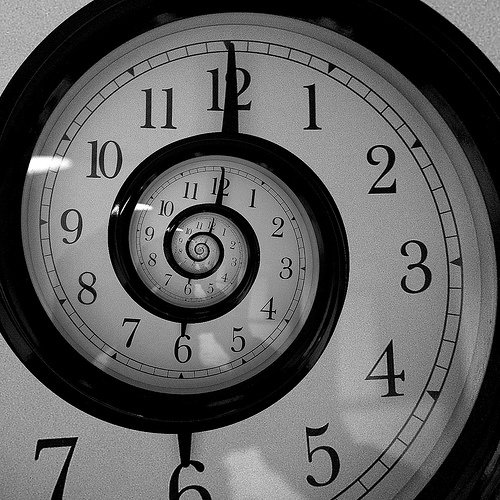Perception of Time and the birth of responsibility -part 1
Part 1 - What is time

Time is a very difficult thing to pin down. And yet it seems absolutely fundamental to our life, "time is money", we say , "I don't have enough time", "Time flies", "time drags". and I think we ought to question what time is, because in our ordinary common sense, we think of time in a linear manner - as a one-way motion, from the past through the present and onto the future. Such perception of time, marks an impression, that life moves from the past to the Future, in such a way that what happens now and what will happen is always the result of what has happened. In other words we tend to perceive events as having a begins and ending, in a sense of causality, as if we are driven through time in sequential manner. But could it be that there is no sequenced separate events, but rather a continuous one whole flow of event in time, with no beginning or ending?
Suppose that this universe started with a big bang, as some cosmologists belief. Now when that bang happened it was the present, wasn't it ? and so the universe began in the big bang, then the universe goes off doing its stuff, other events , such as formation of stars and galaxies and planet, and then what we call the present, life as we now know it, came out of the past, from that beginning. That's one way of perceiving time, as if it has beginning point, the big bang.
But the fallacy of causality - the common sense idea that events are caused by previous events from which they form result, is that there is no separate events, called past, its all one event. To see this fallacy, we must understand what we mean by event. suppose this simple event of a newly born baby, now when does this particular event begin exactly? does it occur at the point of birth? or does the baby begin at the moment of conception? or does a baby begin when the spermatozoa are generated in the father ? or the Overman in the mother? or could you say a baby begins when its father was born or when its mother was born ? or perhaps it was way back from our ancestral apes, or even farther back, from single celled organism or as some would believe it was when the almighty decided to create Adam and Eve. All these things can be thought of as beginnings. But we decide for purposes of legal registration that a life begins at the moment of birth. And that is a purely arbitrary decision and it has validity only because we all agree about it.
By simple definition, events are divided into certain periods. For Instance, according to the theory of evolution, the first human(homo erectus) appeared around 1.5 million years ago, and around 30,000 years ago modern humans(homo sapiens) appeared. Now actually, who were the first homo sapiens or homo erectus or the first primate ape who diverged from our ancestral monkey? In other words, where along that line does the first human show up? Take yourself for example, assuming you are modern human, then your parents, they must clearly be humans too. your grandfather, human. your great-grandfather and great-great-grandfather? must all be humans without a doubt. But your grandfather 185 million generations removed? Not a human. He was a fish. Imagine you could take a picture of every ancestor down the line and put them in a big stack. Every father's father's father's [etc.] father. with you at the top and your my fishy grandfather all the way down at the bottom. Now if you journey back in this stack, So where along the stack was the first human? There wasn't one. There's no single point where one became the other. Every photo that we pull from this stack looks pretty much like the photo on either side. Every generation is the same species as its parents and the same species as its children. Homo erectus had Homo erectus parents and Homo erectus kids. Our fishy ancestor? Had fishy fathers and fishy children. You can never pinpoint the exact moment that a species came to be, because it never did. Just like how you used to be a baby, and now you're older. But there was no single day when you went to bed young and woke up old, although sometimes it feels that way.
part 2
if you like this please follow @berek for more :))
I'm not sure about the logical implications of linking time and causality, or the mixing of philosophy with science, although Aristotle thought of science as a natural philosophy, but mixing metaphysics with physics gives me heartburn :)
There is no metaphysics here. Just pure physics and psychology